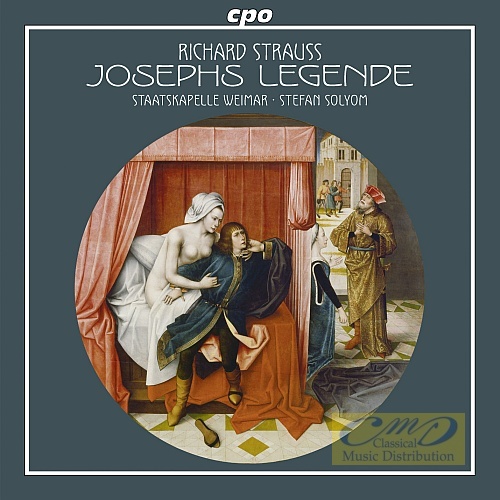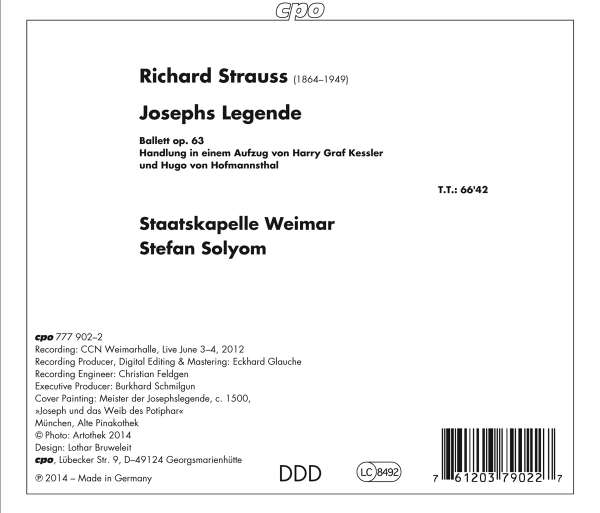
classical music distribution


(Produkt nie został jeszcze oceniony)
kompozytor
Strauss, Richard
tytuł
Strauss Richard: Josephs Legende
wykonawcy
Staatskapelle Weimar;
Solyom, Stefan
Solyom, Stefan
nr katalogowy
CPO 777902
opis
During a guest performance in Berlin in 1913 Richard Strauss saw Sergei Diaghilev's Ballets Russes and was so delighted by them that he declared his readiness to compose the ballet pantomime Josephs Legende (Joseph's Legend) for this extraordinary ensemble. The librettist Hugo von Hofmannsthal had also become acquainted with the Ballets Russes as »the practically unlimited pleasure of pure sensuous joy.« The story of the Joseph legend was not new territory for Strauss inasmuch as the Bible and the Orient had previously supplied him with material for his Salome. Moreover, the subject matter offered yet one more variation on an old Strauss theme: love between an older woman and a youth. Potiphar's wife belongs to the magnificently sultry world of wealth and power and feels sexual desire for an unspoiled shepherd boy, a dancer and a dreamer, who »has not yet been together with a woman.« To depict the sumptuous sound world of the Orient, Strauss exploits all the resources the late-romantic orchestra has to offer. Instead of producing a mixed sound, however, he relies on harsh contours. This is music full of clarity, mental acuity, and immediacy of expression.
nośnik
CD
gatunek
Muzyka klasyczna
producent
CPO
data wydania
28-05-2014
EAN / kod kreskowy
761203790227

(Produkt nie został jeszcze oceniony)
cena 58,00 zł
lubProdukt na zamówienie
Wysyłka ustalana indywidualnie.
Darmowa wysyłka dla zamówień powyżej 300 zł!
Darmowy kurier dla zamówień powyżej 500 zł!
sprawdź koszty wysyłkiProduktu jeszcze nie zrecenzowano, chcesz być pierwszy?
Klienci, którzy kupili ten produkt, kupili również
Sibelius, Jean, Prokofiev, Sergey
Prokofiev: Peter and the Wolf / Sibelius: Symphony No.2
8.111290
Bach, Johann Sebastian, Mozart, Wolfgang Amadeus, Shostakovich, Dmitry
Shostakovich, W.A. Mozart, J.S. Bach: Piano Concertos
DE 1043
różni kompozytorzy
William Primrose Recital Vol. 2 - Bach, Haendel, Paganini, Schubert, Brahms
8.111383
różni kompozytorzy, Monteverdi, Claudio, Grandi, Alessandro
Liquefacta est... - Monteverdi, Grandi, muzyka sefardyjska
NAYA 667
Pozostałe płyty tego kompozytora
Strauss, Richard, Schulhoff, Erwin
Schulhoff: String Sextet/ Strauss: Metamorphosen
PMR 0010
różni kompozytorzy
Berlioz: Symphonie fantastique, Ravel: Daphnis et Chloé, La Valse, Debussy: La mer, Strauss: Also sprach Zarathustra, ...
C 7136
Strauss, Richard
Zubin Mehta with the Israel Philharmonic Orchestra in Rehearsal "Till Eulenspiegel"
DVD 100286
Strauss, Richard, Strauss, Franz
Strauss, Franz & Strauss, Richard: Horn Concertos
PC 10312
Liszt, Franz, Dukas, Paul, Strauss, Richard
WYCOFANY Strauss, Debussy, Dukas, Liszt
MEL CD 10 02496
Pozostałe płyty tego wykonawcy
Joachim, Joseph
Violin Concerto in the Hungarian Style Op. 11, Violin Concerto in one movement Op. 3
8.570991
Reznicek, Emil Nikolaus von
Reznicek: Symphonische Suite No. 1; Traumspiel-Suite; Karneval-Suite
CPO 555 056-2
Napisz recenzję dla: Strauss Richard: Josephs Legende
Zapytaj o dostępność produktu
Twoje zapytanie:
Odpowiemy na adres:
Produkt został dodany do koszyka

Strauss, Richard
Strauss Richard: Josephs Legende
1 szt











































